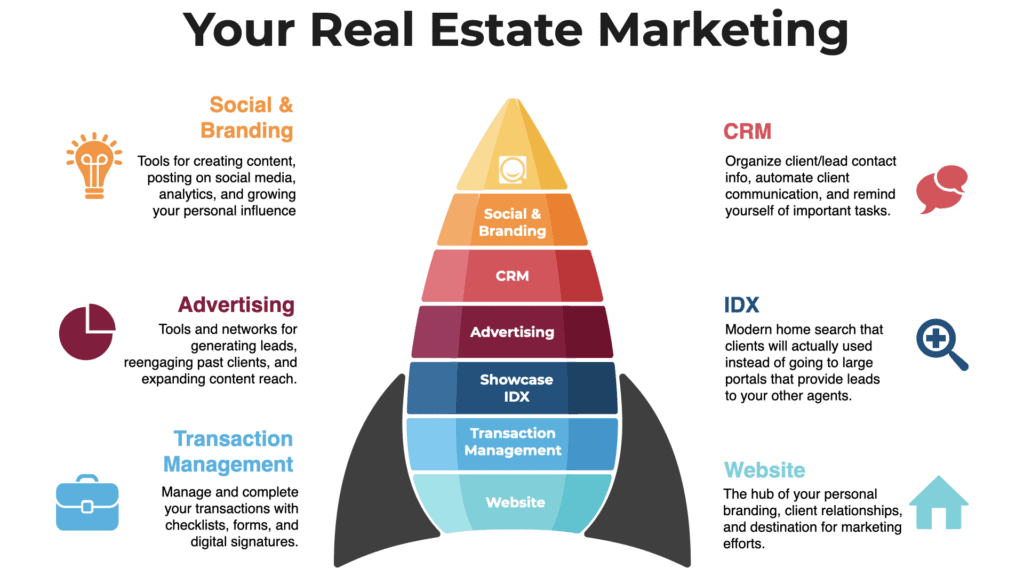Technology is rapidly changing how real estate agents do business in today’s world. As we move through and beyond, it’s more important than ever for real estate agents to understand how technology can help them increase their gross commission income.
By utilizing a tech stack – which includes software tools, online services, and other digital resources – agents can take advantage of new opportunities to become more efficient while providing better customer service.
This article will explore what real estate agents need to know about using a tech stack to maximize their gross commission income in 2023 and beyond.
What Is a Tech Stack? Is it Essential?
A tech stack, often called solutions stack, is a collection of software tools, services, and other digital resources used together to help real estate agents become more efficient and provide better customer service.
For example, agents can use a tech stack to automate listing management and marketing campaigns while having access to powerful business analytics tools. Tech stacks can include anything from a modern IDX to CRM software, marketing automation platforms, cloud storage solutions, and transaction coordination platforms.
While most real estate agents may not see the immediate value in using a tech stack, all agents are using a real estate tech stack that impacts the overall success of their business. The issue for most agents is that they have not made the intentional choices as to who provides each part of the tech stack for their individual business and growth strategy. By streamlining processes and allowing agents to manage their time better, they can be more productive and focus more on selling homes.

Additionally, having access to powerful analytics tools will enable them to better understand their target markets, have a website that their clients want to use, and identify opportunities to increase their gross commission income.
However, one important thing to remember about tech stacks, especially for real estate agents, is that they can’t just be made up of disparate tools and services. Instead, the tech stack needs to be well-integrated to be effective.
The Benefits of Having a Well-Integrated Tech Stack
There are many benefits to having a well-integrated tech stack for real estate agents. Let’s take a look at some of the most important and popular tech stacks:.
Helps Improve Your Efficiency
A well-integrated tech stack can help real estate agents significantly improve their efficiency, allowing them to focus more on selling homes. By using automated processes and having access to powerful analytics tools, agents can more easily identify opportunities and make informed decisions.

For example, let’s say an agent wants to increase their presence in a specific neighborhood. With the help of an integrated tech stack, the agent can quickly identify which neighborhoods have the highest potential for success and target those areas with their marketing efforts. This is a much more efficient way to target potential buyers than simply blanketing an entire town or area.
Enhances Customer Experience
Real estate clients expect excellent service and communication; a well-integrated tech stack can help agents meet those expectations. For example, powerful real estate customer relationship management software allows agents to track and manage client relationships more effectively.
This will allow Realtors to better understand their clients’ needs and provide them with a better overall experience. Additionally, agents can use communication tools such as email marketing platforms to stay in touch with clients and meet their needs.
One of the best parts about this is that it can all be done automatically, through either Premium integrations or a platform like Zapier, saving agents time and allowing them to focus more on selling and improving their business process and impact.
Great as Marketing and Sales Support
Reliable analytics and insights from a well-integrated tech stack can be invaluable for real estate agents looking to optimize their marketing and sales strategies.
With the help of these internal tools, agents can analyze data such as price trends and market activity to identify potential buyers and sellers. They can also use data to track their performance and measure the success of their campaigns.
Access to this information can help agents determine the best strategies to use when selling a home, for example, enabling them to close deals more quickly and maximize their commission.
Access to Relevant Insights
Finally, well-integrated, modern tech stacks can give agents access to relevant insights they may not have been able to get on their own. Some of these insights include the following:
- Property data such as sale prices, average days on the market, and inventory levels
- Mortgage rates and eligibility criteria
- Market trends and analysis
- Demographic data such as age, income, and education levels (which you can add to every listing detail page on your website automatically too)
With this kind of data, agents can draw conclusions and make informed decisions about their business. They can use the insights to understand their market better, target potential buyers and sellers more effectively, and stay competitive.
Your tech stack should allow you to track your numbers, so you know which strategies are working and which aren’t.
Which Tech Solutions Should You Add to Your Stack?
While countless tech solutions are available for real estate agents, a few stand out as particularly valuable. Here is a list of some of the most useful tools and why agents should consider adding them to their tech stack.
Internet Data Exchange Feed

Internet Data Exchange (IDX) feeds are powerful tools for real estate agents because they give agents access to a wide range of real estate listings from other brokerage websites, enabling them to search and list properties from different websites in one central location.
This saves agents from manually searching through multiple websites or manually searching MLS.
Additionally, agents can use IDX feeds to sync their clients’ customer relationship management contacts with other sites.
Integrating an IDX feed into a modern tech stack not only simplifies the process of finding properties and customers but also allows real estate agents to optimize their marketing efforts by increasing the visibility of their services and generating leads more efficiently. Including an effective IDX feed into a tech stack will benefit any real estate agent looking to streamline their operations.
Website Builders
Website builders offer high convenience and value for organizations looking to create or revamp their online presence. For real estate agents, website builders are invaluable resources that help encapsulate their brand identity and share it professionally with the world.
By incorporating a website builder into their tech stack, real estate agents can create a modern, intuitive website ever faster — even if they have neither coding expertise nor experience with web development.
Website builders have drag-and-drop editing tools, hundreds of customizable themes, advanced search engine optimization capabilities, powerful analytics data tracking options, and more features tailored for real estate agents.

Moreover, real estate agents utilizing website builders can benefit from having a unified place to manage all aspects of their online real estate business workflow —from property listing pages to client lead forms. This ultimately makes running an effective digital presence much easier across the board.
Some of the best website builders for real estate agencies include WordPress, Wix, Squarespace, and Weebly.
WordPress
When it comes to website builders for real estate agents, WordPress is an excellent option due to its affordability, scalability, and easy-to-use features. In addition, WordPress boasts a vast range of plugins that allow real estate agents to customize their websites exactly how they want them and integrate powerful features like contact forms, property search bars, and much more.
WordPress also has a wide selection of themes specifically designed for real estate agents, allowing them to create a professional, modern website without starting from scratch. With WordPress, agents can quickly and easily set up a website that helps them attract potential buyers and sellers.
Wix
Wix is an excellent option for real estate agents looking to create a modern, intuitive website quickly. One of the significant benefits of using Wix is its wide selection of customizable templates and themes, making it easy to create a professional real estate website without knowing how to code or have a software team.
Wix also has an extensive library of apps and plugins, allowing agents to easily customize their websites based on their needs. Additionally, Wix’s powerful analytics tools and real-time visitor tracking capabilities allow agents to monitor their website performance, determine how effective their digital marketing efforts are, and make improvements where necessary.
Squarespace
Squarespace is another popular website builder, but one that agents should steer away from if they want a modern home search their clients will use. Squarespace has a range of user-friendly templates and themes and the ability to drag-and-drop elements like images, video, and text without coding knowledge.
Squarespace offers powerful analytics tracking capabilities that allow real estate agents to understand their website performance better. This helps them determine which areas of their website are performing well and which need improvement, as well as track the effectiveness of their digital marketing campaigns.
Weebly
Last but not least, Weebly is another great website builder, but also one Realtors need to stay away from. Weebly offers a wide range of customizable themes, powerful SEO features, and easy-to-use drag-and-drop design capabilities. Agents can also take advantage of Weebly’s comprehensive analytics tool, which helps them identify areas on their website that need improvement and track the success of their digital marketing campaigns.
Ultimately, the right website builder for real estate agents will depend on their individual needs and preferences. However, with the wide selection of website builders, agents have plenty of options when creating a professional, modern website for their business.
Customer Relationship Management (CRM) Software
CRM software is an invaluable asset for real estate agents looking to track current relationships and lead prospects. It stands for Customer Relationship Management and allows real estate agents to reliably store detailed information on clients, such as personal details, property information, and notes of correspondence they have had.
Additionally, CRM software allows users to schedule tasks, email marketing campaigns, and keep team members aware of upcoming deadlines – all in one easy-to-use application. Utilizing CRM software in a tech stack provides the perfect balance between automation and authentication.

Agents can easily automate much of the administrative tasks of managing prospect data and engaging with buyers while ensuring leads receive a human touch throughout the process. Increasing efficiency while improving quality helps real estate agents stay competitive while better serving their customers.
Some examples of CRM software include Follow Up Boss, LionDesk, kvCORE, Salesforce, HubSpot, and Zoho. Choosing the right CRM software is essential for agents looking to maximize their gross commission income in 2023 while providing better user experiences and backend services.
Appointment Applications
Appointment applications benefit real estate agents who need to organize and manage their appointments efficiently. These applications allow for easy scheduling, tracking, and managing multiple tasks simultaneously. It also offers reminders for clients, helping to ensure that the meeting or appointment stays on track.
By integrating appointment applications into a tech stack, real estate agents can take full advantage of this robust software platform and increase productivity while reducing time spent on administrative duties.
For example, let’s say that an agent is managing three appointments with clients in one day. Instead of manually writing down the details for each appointment and trying to remember when they are scheduled and when each client has availability, the agent can use an appointment application to store all of the information in one place, set reminders for themself and their clients, and easily refer back to the details.
Calendly, OnceHub, and Appointy are some of the most popular appointment applications in use today. When looking for the right appointment application for your specific situation, consider pricing, user reviews, and the application’s features.
A Unified Email Client
We often take email for granted, but it is essential to any real estate agent’s tech stack. A unified email client allows agents to easily manage multiple accounts in one place, saving time and increasing productivity.
For instance, an agent might be managing multiple accounts for different clients simultaneously and a unified email client allows them to quickly switch between the accounts without having to log in and out of each one. Additionally, unified email clients offer a variety of features, such as email templates, auto-responders, and integration with other web or mobile applications in the tech stack.
While you might be tempted to use the default email client on your computer, several more powerful and feature-rich options are available. For example, Outlook and Gmail have features tailored specifically for real estate professionals.
Project Management Apps
Project management apps are great, especially for real estate managing clients and tasks simultaneously. These programs enable users to access, store and manipulate data stored on the cloud from anywhere. For instance, customers can view tasks on their devices from remote locations or assign projects to team members quickly.
Some popular project management apps include Trello, Basecamp, and Asana – all of which have a range of features tailored for shareholders in the real estate industry.
For example, Trello offers templates that allow an entire sales process to be tracked at every stage. In addition, Basecamp comes with a time-tracking feature that will enable agents to schedule tasks within specific deadlines. At the same time, Asana gives users the power to set goals with built-in reminders and notifications when they are approaching their due dates.
By including these types of tools with cloud services in their tech stack, real estate agents can benefit significantly by automatically organizing tasks efficiently rather than wasting time trying to keep everything organized manually.
Social Media Management Software
Social media management software is the perfect tool for real estate agents to succeed in the digital space. By including this technology in their tech stack, agents gain a powerful arsenal of features to monitor and analyze their presence on various popular social media platforms like Facebook, Instagram, and Twitter.

These tools can help agents manage content strategy, schedule campaigns ahead of time, delegate tasks to an entire team, track successes and failures across social media platforms with one centralized system, and customize messaging for different locations or demographics.
To give some specific examples, Sprout Social is a great feature-rich platform for enterprise-level social media marketing. Hootsuite enables its users to manage unlimited profiles from one easy-to-use dashboard.
For real estate agents seeking a comprehensive solution for managing multiple social media platforms from one place – these two options are worth looking into. Both provide Google Analytics integration. Social Media Management Software with Google Analytics integration allows measuring how social media impacts web traffic.
Media Editing Software
Real estate professionals know the importance of visual marketing for getting the word out about new listings. That’s where media editing software can be beneficial.
It allows agents to edit photos, videos, and graphics quickly and easily, giving their visuals that extra boost they need to stand out.
Popular examples of media editing software include Adobe Photoshop, Corel Photo-Paint, Lightroom CC Photo Editor, and Pixlr X. All of these give real estate agents a chance to create high-quality visual content with a fast development process and few resources – meaning they can focus on what matters: helping clients buy or sell their home.
From making subtle color adjustments to cropping images or even blending multiple photos, media editing software can help enhance photographs in a way that captivates viewers – making it a great addition to any real estate tech stack.
However, one of the things to keep in mind when it comes to media editing software is that, for some programs, the learning curve isn’t necessarily easy – especially for new users. And if you’re spending all your time learning how to use the software, it can be a bit counter-productive since you won’t spend that time making sales or helping out clients.
So as you begin searching for the perfect media editing software for your tech stack, it’s essential to make sure that the one you choose is both user-friendly and includes at least most of the features you need.
Cloud-Based Contract Solutions

A cloud-based contract solution is essential for real estate agents looking to increase their commission income in 2023. This type of software allows agents to securely store and share contracts online with clients and other agents and generate legally binding documents from their tech stack.
Popular cloud-based contract solutions on the market include DocuSign, PandaDoc, and Dropbox Sign. All three of these offer a variety of features to help simplify the contract process for real estate agents, such as digital signatures, document templates and personalization tools, comprehensive tracking of contracts and activities, automated reminders and notifications, secure document storage, and integrated eSignature workflows.
By adding a cloud-based contract solution to their tech stack, real estate agents can easily create and customize contracts, share them with clients and other agents in minutes, keep track of all their activities, and even store documents securely in the cloud. Plus, they can do all of this without worrying about printing or scanning anything, saving them a lot of time and energy in the long run.
Cloud Storage Services
Speaking of cloud-based services, another tool real estate agents should have in their tech stack is cloud storage. This service allows users to store and access files from any device, anywhere in the world.
Popular cloud storage options include Dropbox, Google Drive, iCloud, and Microsoft OneDrive. There’s no wrong choice since all of these offer reliable storage space and numerous security features to ensure that your files are always kept safe and secure.
Out of the options above, Google Drive is the most popular choice for real estate agents. This service offers plenty of storage space and various tools to help streamline the process of managing, editing, and sharing files. Plus, it integrates with several other services, such as Google Sheets and Google Calendar, making it an excellent choice of technology stack for real estate agents.
FAQs
Here’s a brief list of frequently asked questions that help clarify any doubts you may have.
What tech stack does Zillow use?
Zillow is one of the most popular websites for potential buyers and sellers, so it stands to reason that they would be using a tech stack designed for their specific needs. It consists of components such as Python, Rabbit MQ, and Apache Tomcat used to create a proprietary tech stack not available to individual agents. It’s a great example of what a web service should look like, with excellent stability and scalability factored into the design.
Compared to individual real estate agents who might not have big budgets to dedicate solely to technology, Zillow offers an array of services that can be provided from a single agent’s website. However, using a platform like Showcase IDX to power the agent’s website allows individual Realtor’s to have a website that acts as a digital hub to their website and provides a home search their clients will use while protecting the homebuyer’s private information.
However, just because individual real estate agencies may not have the budget to afford Zillow’s tech stack doesn’t mean they can’t still benefit from using their own tech stack to help increase their gross commission income.
Real estate agents can still create efficient workflows, reduce overhead costs, and ultimately increase their profits by investing in the right services and internal collection of tools.
What should be included in a tech stack?
Technology is an integral part of the real estate market, and a robust tech stack is essential for agents looking to succeed in the field. A good tech stack should include individual components to help streamline operations, enabling agents to handle their ever-increasing workloads more efficiently.
Items such as a modern IDX, a CRM, a marketing suite, secure file collaborations, automated lead generation systems, and analytics software are all essential to building the perfect tech stack. Moreover, depending on the scale of their operation and services offered, agents also need to consider including hardware such as cameras or audio/visual equipment for virtual viewings.
With the right technology at their fingertips, real estate agents can easily organize and maintain an effective working practice that ensures maximum productivity.
What is an example of a tech stack?
An example of a tech stack would include MailChimp for email marketing, Slack for collaboration, PipeDrive CRM for customer management, WordPress for website hosting, and Zapier to automate tasks. Depending on the agent’s needs, additional components could include financial platforms or an AI-driven chatbot.
The benefits of investing in a tech stack are plentiful, from improved customer outreach to more efficient operations. As the real estate market evolves at an unprecedented rate, agents need to stay up-to-date with their tech stack to remain competitive and maximize their profits.
By understanding how to use the various components at their disposal best, agents can ensure they make the most of their tech stack and ultimately increase their gross commission income in 2023.
What is the most in-demand tech stack?
For any business today, having a solid and in-demand tech stack is essential to success. This means utilizing the best technologies, servers, infrastructure, and frameworks available to ensure their product or service is as reliable and secure as possible.
One of the most in-demand tech stacks for proprietary tech stacks out there right now is the combination of cloud platforms such as AWS or Google Cloud Platform combined with a modern technology stack such as Java, NodeJS, or React Native.
This gives businesses a robust combination of scalability and redundancy to support even the most demanding applications to keep customers happy and operations running smoothly. Best of all, this type of technology stack is relatively accessible for almost every budget.
Individual agents need to think about whether they want an all-in-one solution (e.g., kvCORE) or their best-in-class point solution tech stack.

What is a tech stack in sales?
A tech stack in sales is an innovative way to optimize business process and performance. It is an amalgamation of software and systems essential in streamlining sales processes, such as lead generation, customer segmentation, and contact management.
A tech stack can help a sales team boost productivity, analyze customer data more effectively, and develop better customer engagement strategies. In addition, the integration capabilities of a tech stack allow the sales team or department to work more seamlessly while having access to real-time insights from across their entire organization.
Tech Stack For Sales vs. Tech Stack For Real Estate
The difference between a tech stack strictly for sales as compared to one for real estate agents is the inclusion of hardware for virtual viewings and software and services specifically tailored to the real estate market.
Luckily, real estate agents can combine the best aspects to create a tech stack that helps them succeed in the competitive market. By understanding how to best use the various components, agents can ensure they make the most of their tech stack and ultimately increase their gross commission income in 2023.
Where can I find a website developer or marketing expert to help me with my real estate tech stack?
It’s essential to find a website developer or marketing expert specializing in the real estate industry and understand agents’ unique needs. There are various online directories where agents can find professionals.
Before engaging with a website developer or marketing expert, agents need to research their experience and portfolio of work. Agents should also request a consultation call or meeting to discuss their tech stack needs in detail and ensure they are making the right decision.
A great place to find a website developer or marketing expert is through Showcase IDX, which can connect agents with real estate tech stack experts worldwide. With the help of these experienced developers, agents can develop a comprehensive and unique tech stack tailored to their individual needs, helping them maximize their profits in 2023.
Where can I find examples of significant real estate websites?
When designing an efficient and effective website, agents should look towards other real estate websites for inspiration.
These websites provide examples of the best real estate websites from around the world in terms of design and technology. In addition, agents can use these examples to gain inspiration and insight into creating a great website. Real estate agents can also see examples of significant real estate websites such as Showcase IDX.
Conclusion
Real estate agents can increase their gross commission income in 2023 by utilizing a tech stack tailored to the unique needs of their business. A comprehensive tech stack should include the following:
- A customer relationship manager (CRM).
- An IDX (home search)
- Marketing suite.
- Secure file collaboration platforms.
- Automated lead generation systems.
- Analytics software.
Agents should also consider adding hardware for virtual viewings, depending on the scale of their operations.
To ensure that their tech stack meets their needs, agents should enlist the services of a website developer or marketing expert specializing in the real estate industry. Furthermore, agents can use online resources to access examples of great websites for inspiration.
With the right tech stack, real estate agents are sure to see their businesses grow and evolve in the coming years. 2023 is sure to be an exciting year for real estate as agents embrace new technologies and strategies that can help increase their gross commission income.
- Author Details





